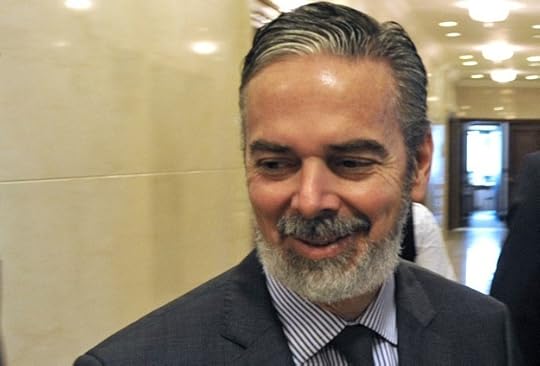David Rothkopf's Blog, page 98
December 11, 2012
The Fierce Urgency of Now - By David Rothkopf
The Extricator in Chief - By Aaron David Miller
fantasies. Barack Obama's not going to reshape the world order in his second
term.
December 10, 2012
Access Denied - By John Arquilla
Internet even if it wanted to.
Return of the Silviosaur - By James Walston
Sunset Boulevard meets Jurassic Park.
Decline Is a Choice - By Hubert Védrine
November 25, 2012
December 2012

Link:
http://www.foreignpolicy.com/node/141...
Preview Link:
http://www.zinio.com/express3?issn=00...
Story1 Section:
Cover Story
Story1 Title:
The 2012 Global Thinkers List
Story1 Link:
http://www.foreignpolicy.com/2012glob...
Story2 Section:
Feature
Story2 Title:
The Stories You Missed in 2012
Story2 Link:
http://www.foreignpolicy.com/articles...
Story3 Section:
David Rothkopf
Story3 Title:
The Opposite of Thinking
Story3 Link:
http://www.foreignpolicy.com/articles...
Issue Number:
197
June 22, 2012
Mini 6.22
June 17, 2012
July/August 2012

Link:
http://www.foreignpolicy.com/node/128...
Preview Link:
http://www.zinio.com/express3?issn=00...
Story1 Section:
Cover Story
Story1 Title:
The Failed States Index: An FP Special Report
Story1 Link:
Thttp://www.foreignpolicy.com/failed_s...
Story2 Section:
Feature
Story2 Title:
Head of State
Story2 Link:
http://www.foreignpolicy.com/2012/06/...
Story3 Section:
Report
Story3 Title:
General Mladic in the Hague
Story3 Link:
http://www.foreignpolicy.com/articles...
Issue Number:
194
February 28, 2012
Brazil's new swagger

As of today, David Rothkopf's blog will be replaced by a weekly column.
For the next few weeks, his column will also appear in this space.
While America's halting path toward
accepting the world's new multipolar reality involves a step backward for every
step forward, an exceptionalist violation of sovereignty for every bit of teamwork
in places like Libya, other countries are actively working to establish new
rules for all nations to follow in the new era.
Among those at the forefront of this
effort are Brazilian President Dilma Rousseff and her highly regarded foreign minister,
Antonio Patriota. He was in New York last week to advance this effort at the United
Nations, and we sat down for lunch together.
The challenge facing Rousseff and
Patriota as public servants is a daunting one. Each follows in the footsteps of
a formidable predecessor. Admittedly, Rousseff's challenge is much greater and
indeed, to many, seems almost insurmountable. She succeeds two presidents who
were arguably the most important in her country's modern history, Fernando
Henrique Cardoso, who is credited with stabilizing the country's economy after
years of volatility, and her immediate predecessor, Luiz Inácio Lula da Silva,
not only her mentor but one of a tiny handful of the world's most important
leaders of the past decade. But Patriota's predecessor, Celso Amorim, was also
formidable, extremely influential, and a fixture on the Brazilian and
international scenes. The bar was set high for her entire administration.
Nonetheless, after over a year in
office, despite facing great domestic and international challenges, Rousseff
has already earned a higher popularity rating than did Lula at a similar
point in his tenure. And Patriota is quietly and, in the eyes of close observers,
with great deftness, building on Amorim's groundbreaking work to establish
Brazil as a leader among the world's major powers.
"We have a great advantage," notes
Patriota. "We have no real enemies, no battles on our borders, no great historical
or contemporary rivals among the ranks of the other important powers … and
long-standing ties with many of the world's emerging and developed
nations." This is a status enjoyed by
none of the other BRICs -- China, India, and Russia -- nor, for that matter, by any of the world's
traditional major powers.
This unusual position is strengthened
further by the fact that Brazil is not investing as heavily as other rising
powers in military capabilities. Indeed, as Tom
Shannon, the U.S. ambassador to Brazil, has noted, the country is one of the few to effectively stake its
future on the wise application of soft power -- diplomacy,
economic leverage, common interests. It's surely no coincidence that, in areas
from climate change to trade, from nonproliferation to development, Brazil
under Lula and Amorim and under Rousseff and Patriota has been gaining strength
by translating steady growth at home and active diplomacy abroad into effective
international networks.
But Rousseff's administration is also
breaking with the past. Whereas Cardoso and Lula achieved greatness by
addressing and solving some of the most bedeviling problems of Brazil's past,
from stabilizing the economy to
addressing social inequality, Rousseff, while still cognizant of the work that
remains to be done, has also turned her attention to creating opportunities and
a clear path forward for Brazil's future. From her focus on education to her
commitment to science and technology through innovative programs like "Science Without Borders," she is doing
something that no Latin American leader has done before but that has been a proven
formula in Asia. She is committed to moving Brazil from being a resource-based
and thus dependent (which is to say vulnerable) economy to one that counts more
for future growth on value-added industries, research and development, and
educating more scientists and engineers.
Click here to read the full article.
January 27, 2012
Chicken Little is full of pompous baloney

There seems to be a general consensus that the world is in
lousy shape. There is also a pretty widespread belief that the U.S. is a mess. Also
that Washington is a cesspool of corruption and incompetence. In fact, there is
a prevailing view that times are pretty dire here in America. The president and
the Republican candidates speak ominously of the threats we face and speak
wistfully of the past or inspiringly of better tomorrows. It's no wonder that Midnight in Paris was one of the past year's signature films. Everyone is
suffering from golden age-ism, yearning for anything but what we've got.
But what if the premise is wrong? What if these are actually
the best of times? What if we are living in the best moment in U.S. history and
we are not even enjoying it?
One of the few certain facts I have learned since I left the
fine public schools of Union County, New Jersey is that into every life come
good developments and bad developments, but that we seldom know the difference
while they are unfolding. It is only years later that we can tell whether it
was a good thing or a bad thing to get or lose a job or a date or make a move
to a new city.
I wonder if it goes further and we just don't know a good thing
when we see it.
For example, I got an email today from a friend who lamented
the state of Washington (not the one with Walla Walla in it, but the condition
of our federal government). She earnestly offered up the conventional wisdom
that things have never been worse. But read any history of Washington and there
was just as much bickering and conniving and in-fighting and stupidity and
sometimes there was much more. From the innuendo-driven personal scandal
swirling around Alexander Hamilton to cane fights on the floor of the House in
the 19th Century to machine politicians cutting sweet deals while
ignoring the deplorable state of civil rights in America during the 20th,
there has always been plenty to complain about. People wax on about the comity
of the good old days, but for all the comity the good old days were periods in
which women, blacks, Jews, Hispanics, and other minorities weren't given a seat
at the table and during which powerful pols managed to coax reporters into
looking the other way over scotch and soda at a Georgetown cocktail party.
Or look at U.S. history. Sure, we're going through a tough
economic time now. The downturn is the worst since the Depression. But the Great Recession was
not a depression, and it was a recession starting from a much much higher standard of living then in the 1930s, and
people today live longer, healthier, happier lives with shorter work weeks,
more conveniences, and more information at their fingertips than ever before. And
then there's the history itself. This may well be the least precarious moment
in U.S. history. The first decades of our existence were the fragile stuff of a
start-up and there was no certainty we could make it. We were at war with
Britain again within three decades or so of the revolution. The first half of
the 19th Century the country was increasingly torn apart over
slavery culminating in the bloodiest war the world had ever seen as we tried to
work out the issues of what kind of a union if any we wanted to be. The years
after the Civil War saw further wars with the people from whom we stole the
continent, the rise of rapacious megacompanies, and the birth of the KKK and a
new racial divide in the South. Think we're facing a tough economic transition?
At the end of the 19th Century the vast majority of folks in the U.S.
worked in agriculture. We had to change-over our entire economy to
manufacturing, and in the 20th century, the percentages of agricultural jobs actually flipped in the course of 100 years.
Then came the rest of the 20th Century, marked by two world
wars and then the Cold War's threat of oblivion. And then after that came the
recklessness and risks associated with the delusion that we were the world's
hyperpower, the one country that had to be active everywhere and could impose
its will anywhere.
But that's passed. We're still the richest and most powerful
nation on earth and we will be for the foreseeable future. No other nation
comes close to matching our military or economic might. But there are no
existential threats out there on the horizon. We are no longer tilting at the
windmill of a global terror threat that actually turned out to be much less
than we spun it up to be. We are resetting our priorities in a sensible, more
inward-looking way. We are pulling in our oars a bit to restore things at home.
We're debating how to do that but there is very little debate that it ought to
be done. We're working better with others, more cognizant that we need
multilateral solutions and thus better international relationships in order to succeed. The
biggest rising power is also hugely dependant on its trade with us and does not
pose any direct threat to us for many years to come. There are problems out
there but they are nothing compared to the wars or threats of the past. We have
challenges at home, but for most of our history we have faced much greater
risks, much more precarious times. And then there's the Voltaire-ian icing on
the cake: it could be that this is the best of all possible times and we might
as well appreciate it for what it has to offer.
I suppose by the time Monday rolls around I may have a
different view. (In fact, I'm sure of it.) But it's the weekend and you might
as well roll this one around in your head for a while and have a good time.
David Rothkopf's Blog
- David Rothkopf's profile
- 121 followers




